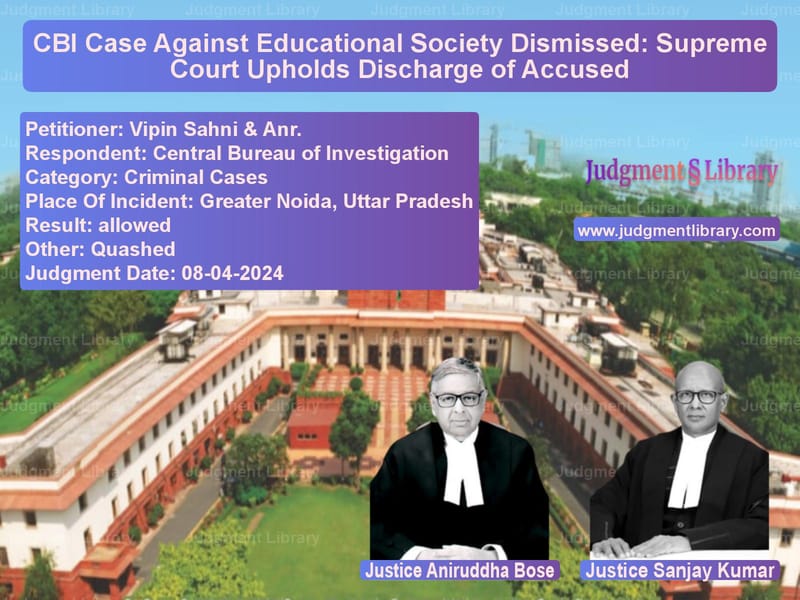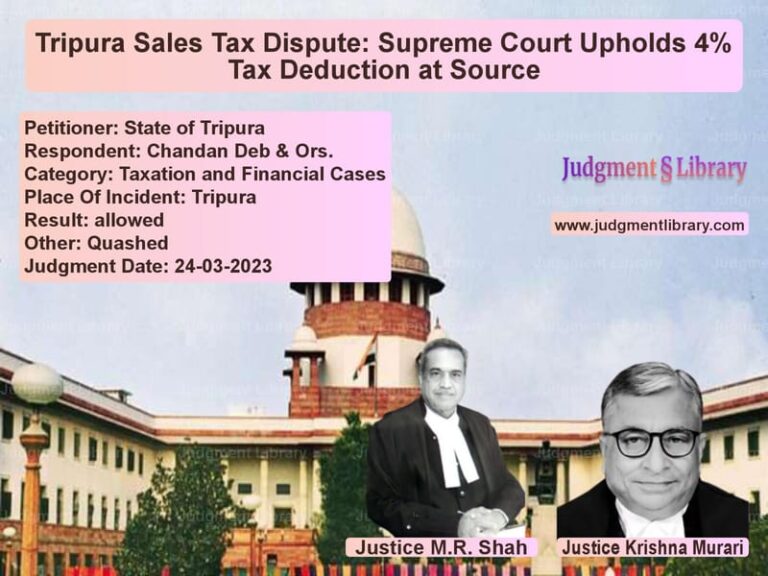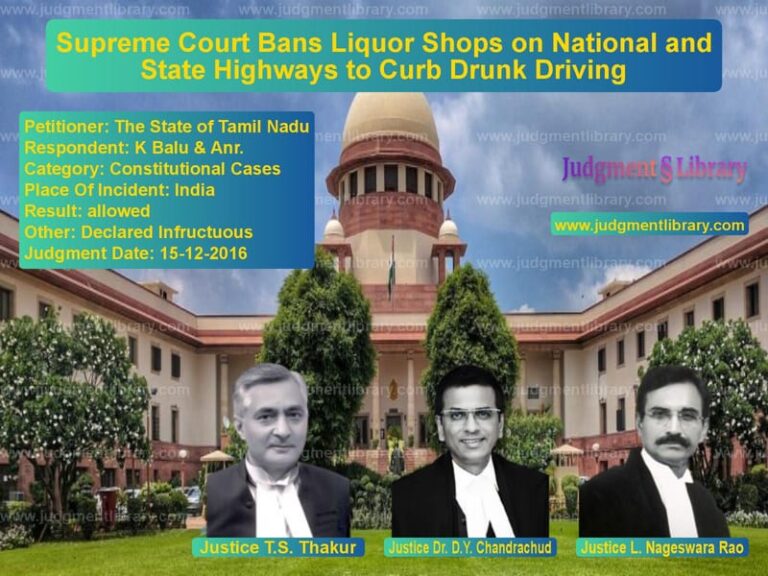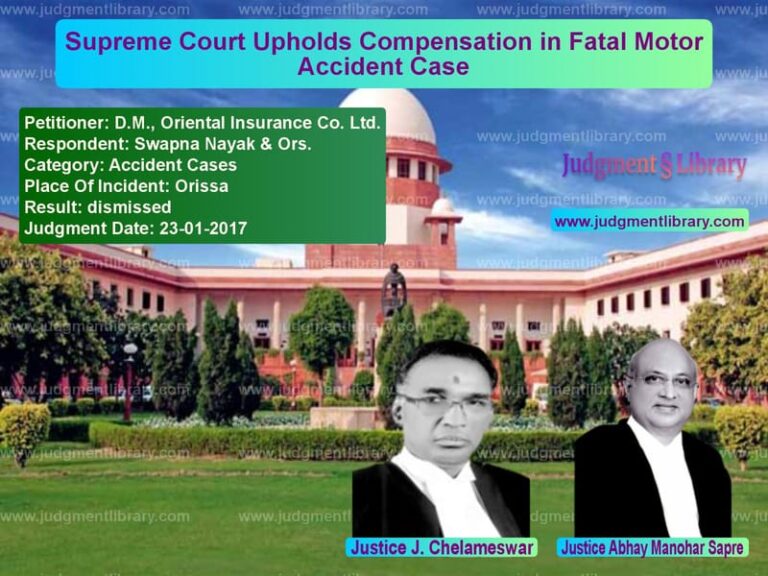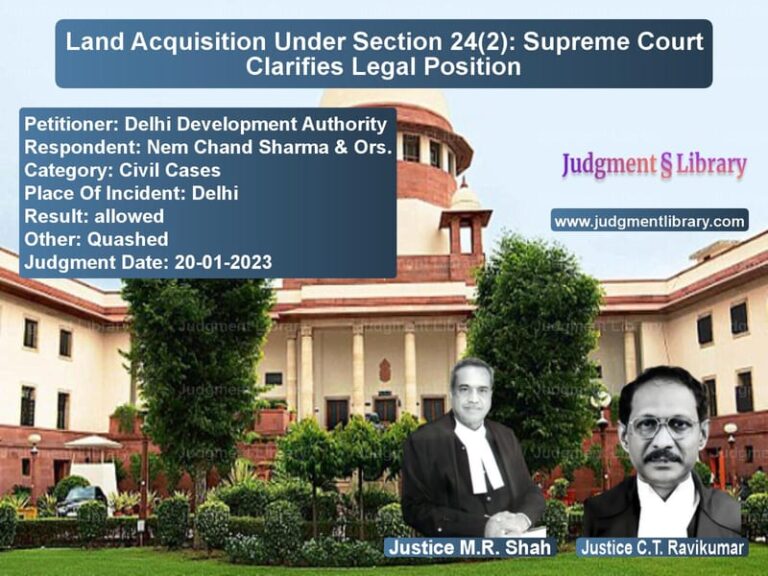CBI Case Against Educational Society Dismissed: Supreme Court Upholds Discharge of Accused
The Supreme Court of India recently delivered a significant ruling in the case of Vipin Sahni & Anr. v. Central Bureau of Investigation. The judgment concerns allegations of fraud and criminal conspiracy against an educational society that had secured approvals from the All India Council for Technical Education (AICTE) to start multiple business schools. The case highlights the importance of proper legal scrutiny in criminal cases and emphasizes that an organization cannot be accused of cheating unless there is clear evidence of deception.
Background of the Case
The appellants, Vipin Sahni and his wife, had established Sunshine Educational and Development Society in 2004, intending to promote technical education. They secured a 90-year lease of 4.90 acres of land in Greater Noida, Uttar Pradesh, for setting up educational institutions. Subsequently, they applied for AICTE approval for three institutions:
- Business School of Delhi
- Business School for Women
- International Business School of Delhi
In their first application, they mentioned that the land had been mortgaged to a bank for a loan, but in subsequent applications, they did not disclose the mortgage status. An anonymous complaint led to an investigation by the Central Bureau of Investigation (CBI), resulting in criminal charges under Sections 420 (cheating) and 120B (criminal conspiracy) of the Indian Penal Code.
The Special Judicial Magistrate, CBI Court, Ghaziabad, discharged the appellants in 2019, finding no evidence of fraudulent intent. However, the CBI challenged this in the Allahabad High Court, which reversed the discharge order. The appellants then approached the Supreme Court.
Arguments by the Appellants (Vipin Sahni & Anr.)
- The appellants contended that there was no deliberate misrepresentation in their applications.
- They argued that AICTE officials conducted a thorough inspection before granting approvals and never raised concerns about deception.
- They highlighted that no AICTE officials were charged, suggesting that the approvals were valid and no one had been misled.
- Their disclosure of the mortgage in the first application indicated an absence of intent to cheat.
Arguments by the Respondent (CBI)
- The CBI argued that AICTE rules prohibited approvals for institutions operating on encumbered land.
- They claimed that the appellants had hidden the mortgage status in subsequent applications to secure approvals fraudulently.
- The CBI maintained that even if AICTE did not complain of being deceived, the omission of key information was enough to constitute fraud.
Key Observations of the Supreme Court
- The Court noted that the first application explicitly disclosed the mortgage status, contradicting the claim of deliberate deception.
- It pointed out that AICTE never raised any complaints of having been misled, making the allegations of cheating untenable.
- The Court ruled that failure to disclose the mortgage in later applications could be a clerical error but did not amount to criminal fraud.
- It emphasized that for a cheating charge to hold, there must be “dishonest inducement” leading to wrongful gains. No such evidence was found.
- The Court criticized the CBI for filing a case long after AICTE had granted approvals and without implicating AICTE officials in the alleged fraud.
Final Judgment
The Supreme Court set aside the High Court’s order and reinstated the discharge of the appellants, stating:
“The AICTE itself never claimed that it was dishonestly induced to grant approvals. This missing link makes it impossible to sustain charges under Section 420 IPC.”
The Court further ruled:
“Mere carelessness in filling out forms does not constitute a criminal conspiracy. The charge under Section 120B IPC also fails for lack of evidence of an agreement to commit fraud.”
With this ruling, the appellants were cleared of all criminal charges.
Implications of the Judgment
- The ruling reinforces the principle that allegations of fraud must be backed by clear evidence of dishonest intent.
- It prevents misuse of criminal law in regulatory compliance matters where no actual harm has been caused.
- The judgment safeguards educational institutions from unnecessary criminal litigation based on procedural lapses.
- It highlights the importance of independent scrutiny before registering criminal cases against businesses and organizations.
Conclusion
The Supreme Court’s decision in Vipin Sahni & Anr. v. CBI underscores the need for due diligence before initiating criminal proceedings in corporate and educational matters. By dismissing the charges, the Court has set a precedent for preventing unwarranted prosecution in cases involving administrative errors rather than deliberate fraud. This ruling strengthens the rights of institutions and individuals facing allegations of regulatory violations, ensuring that criminal law is not misused for technical lapses.
Petitioner Name: Vipin Sahni & Anr..Respondent Name: Central Bureau of Investigation.Judgment By: Justice Aniruddha Bose, Justice Sanjay Kumar.Place Of Incident: Greater Noida, Uttar Pradesh.Judgment Date: 08-04-2024.
Don’t miss out on the full details! Download the complete judgment in PDF format below and gain valuable insights instantly!
Download Judgment: vipin-sahni-&-anr.-vs-central-bureau-of-in-supreme-court-of-india-judgment-dated-08-04-2024.pdf
Directly Download Judgment: Directly download this Judgment
See all petitions in Fraud and Forgery
See all petitions in Corporate Compliance
See all petitions in unfair trade practices
See all petitions in Judgment by Aniruddha Bose
See all petitions in Judgment by Sanjay Kumar
See all petitions in allowed
See all petitions in Quashed
See all petitions in supreme court of India judgments April 2024
See all petitions in 2024 judgments
See all posts in Criminal Cases Category
See all allowed petitions in Criminal Cases Category
See all Dismissed petitions in Criminal Cases Category
See all partially allowed petitions in Criminal Cases Category

